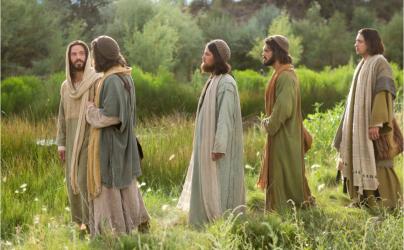If Christianity is to have a worthwhile message to the contemporary world, it must be based on the vision of God that we have received from Jesus himself. It must be based on what He himself saw his mission to be.
 Just to make sure that His disciples understood what His message was all about, Jesus asked them two very pointed questions: Who do people say that I am? Who do you say that I am? The answers to these questions go beyond mere excitement and enthusiasm, and touch the very makeup of the call to discipleship. As the first disciples came to understand who Christ really was and what He was about, they also came to realize what challenges were in store for them as they preached the "Good News."
Just to make sure that His disciples understood what His message was all about, Jesus asked them two very pointed questions: Who do people say that I am? Who do you say that I am? The answers to these questions go beyond mere excitement and enthusiasm, and touch the very makeup of the call to discipleship. As the first disciples came to understand who Christ really was and what He was about, they also came to realize what challenges were in store for them as they preached the "Good News."
It is encouraging to know that, though Peter completely misunderstood who Jesus was and what his mission to the world was, Jesus didn’t give up on him and the others and go looking for better candidates. The Gospel is suggesting that becoming a disciple is a process of coming to sight. The reason we come to worship is to have Jesus once again teach us what our discipleship entails so that we can practice it in our daily lives. We ask to be touched again and again by Jesus and we surrender our lives to the kind of discipleship he describes - dying to self and losing life for his sake. We are always in the process of getting our vision clarified. Or, as Isaiah, using another physical sense, would put it: God is opening our ears so that we may hear.
It is obvious that when Jesus asks, “Who do people say that I am?” and, “But who do you say that I am?” that he isn’t asking idle questions, something to fill up the time as they walk along the road. After all, they are going to Jerusalem, the very place where the things Jesus describes will take place. Peter’s quick answer seems correct, at first, but we learn the real answer is much more complex. Peter and the disciples will have to keep quiet for a while; they have more to learn. It is also obvious from what Jesus says to them, at this stage of instruction: he is not going to be a quick fix for people’s problems.
But instead, for the sake of others, he will enter into human pain, loss and death and give sight to those of us following behind. He is inviting us to let go of our notions of who we think Jesus ought to be for us and accept him as He is - one who accepts the cross and invites us to do the same. This gospel is telling us that divine logic makes more sense than human logic and it offers us a life we could never reason to or achieve on our own.
At the heart of today's Gospel message is the challenge to lose ourselves in concern for others. If we truly love every other person as Jesus has loved us, then we don't look at risk, or color, or public opinion, or all of the other excuses for walking away.
Do you know who I am? Do you know me? Jesus' question is addressed to us now. And we, His followers answer readily, "You are the Christ. You are the Messiah. You are the Son of the Living God." But there is an implied crucial follow-up question as well: "How well do we know Him?"
We cannot just declare our faith in Jesus. If we don’t translate our faith into actions it means nothing and is not enough to save us.
“Who who do you say I am?” is not a question that we need only to answer once in our lives. Our responses will vary, depending upon how we experience God's presence in our lives, and upon our own level of maturity and faith. The Gospel challenges us: Who is Jesus for us now and what is the meaning of Jesus for our lives now? It is important for us to take Jesus’ question seriously each day of our lives.





